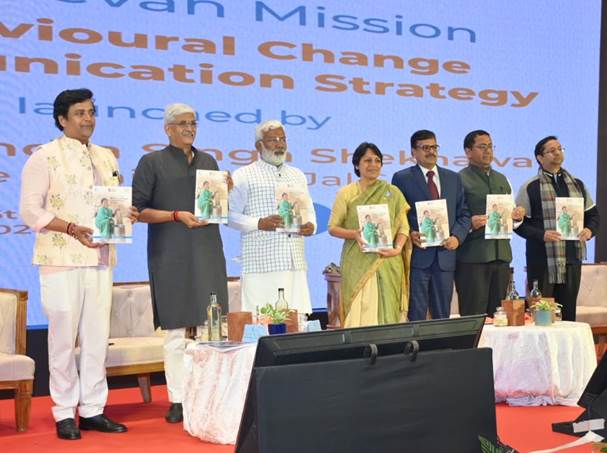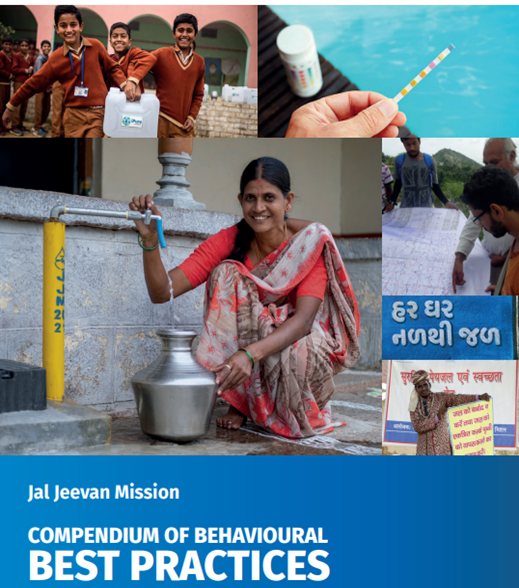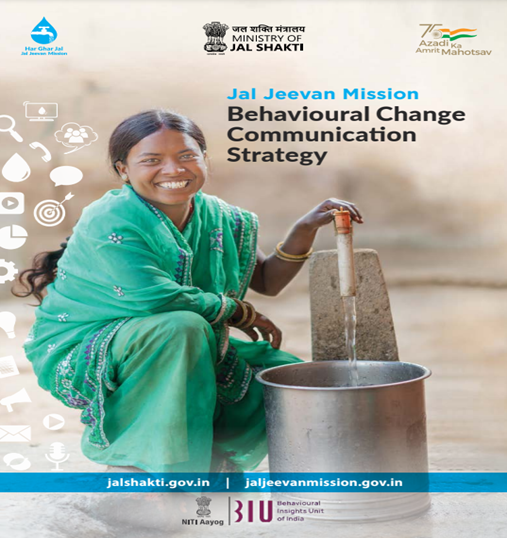
The Jal Jeevan Mission has been working with speed and scale to achieve significant milestones in provisioning tap water connection to rural households across the nation. The Mission has been instrumental in reducing the drudgery of women with immense health and educational benefits, especially for girls. So far, over 14.31 crore (74%) rural households have been covered across India. Recognizing the need for a strategic communication approach, Union Minister of Jal Shakti Shri Gajendra Singh Shekhawat today released the Compendium of Behavioural Best Practices and Integrated Communications Strategy for Jal Jeevan Mission in collaboration with – NITI Aayog, Global Health Strategies, and Behavioural Insights Unit. These groundbreaking documents encapsulate the mission’s relentless efforts and strategic approach to revolutionize water access and management across the nation.

The comprehensive documents have been meticulously crafted to align Information, Education, and Communication (IEC) practices with the Mission’s key objectives. Focused on creating a roadmap for enhanced IEC practices, the documents emphasize positive community participation and includes a segment on Nudges, subtle environmental changes to encourage positive behaviors. The documents were released at the two-day national workshop organized at Lucknow in the august presence of Shri Swatantra Dev Singh, Jal Shakti Minister of Uttar Pradesh; Smt. Vini Mahajan, Secretary-DDWS; Shri Chandra Bhushan Kumar, AS&MD-NJJM; Shri Jitendra Srivastava, JS&MD-SBMG; Shri Anurag Srivastava, Principal Secretary – Govt. of Uttar Pradesh and Shri Ravi Kishan, a popular actor and Member of the Lok Sabha, Gorakhpur, Uttar Pradesh.
Developed in harmony with Jal Jeevan Mission’s core principles, the consolidated best practices and communication strategy seek to champion clean drinking water as an essential need and how provisioning water through taps has ended the century old drudgery faced especially by women and young girls. The Mission has put women at centre stage where they are performing the role of decision makers. The women in villages are monitoring the programme and managing the rural water supply assets. Through targeted Social and Behavior Change Communications (SBCC), ‘Har Ghar Jal’ programme aims to create a Jan Andolan where community participates in water conservation, source strengthening and its judicious use so that regular supply of safe drinking water is ensured for long-term.
Jal Jeevan Mission Compendium of Behavioural Best Practices – A Comprehensive Insight into Progress and Achievements : The Compendium is a testament to the dedication and progress achieved under Jal Jeevan Mission. This comprehensive document provides an in-depth analysis of the mission’s accomplishments, challenges faced, and the transformative impact on rural communities. From infrastructure development to the empowerment of local communities, the report reflects the mission’s commitment to ensuring “Har Ghar Jal“.

Key highlights:
- An overview of the significant strides made in the development of water supply infrastructure, emphasizing the mission’s commitment to quality and sustainability.
- Insights into the community-led initiatives that have played a pivotal role in ensuring the success of the mission, fostering a sense of ownership and responsibility.
- Technological Innovations: Exploration of the cutting-edge technologies employed to optimize water management, enhance efficiency, and reduce environmental impact.
- Impact on Health and Education: A glimpse into the positive effects of improved water access on the health and educational outcomes of communities, showcasing the broader societal benefits of the mission.
Behavior Change Communication Strategy: Shaping the Future through Awareness: This document outlines the Mission’s approach to promote positive behavioural changes, ensuring sustainable water usage, and nurturing a water-conscious society.

Key highlights:
- Insights into the carefully crafted messages designed to resonate with diverse communities, encouraging responsible water usage and promoting conservation.
- An overview of the mission’s grassroots-level programs and campaigns aimed at actively involving communities in the water conservation dialogue.
- Exploring use of technology and social media platforms to amplify the reach of the mission’s communication efforts, connecting with citizens on a national scale.
- Highlights collaboration with governmental and non-governmental entities, ensuring a united front in the pursuit of sustainable water practices.
Document Focus
The Strategy & Compendium document is structured around four main facets:
1. Promote sustainable practices for safeguarding water sources, ensuring freshwater availability, maintaining health & hygiene, and enhancing ease of living.
2. Ensure community engagement through collaboration with Panchayati Raj Institutions and community leaders.
3. Increase awareness and visibility around water-related issues and the Mission by involving informed and influential voices.
4. Provide guidance for regional teams regarding IEC & SBCC dissemination and building greater uptake of good water practices.
Implementation and Impact
By leveraging traditional and digital media channels, community-level SBCC activities, and capacity-building initiatives, the document aims to create a supportive environment, garnering support, commitment, and action from communities.
The Compendium of Behavioural Best Practices & Behavioural Change Communications Strategy is a comprehensive guide that not only promotes JJM’s goals but also engages stakeholders at all levels, ensuring the sustained impact of the Mission. The document is poised to facilitate dynamic collaborations and empower stakeholders to positively influence individual, organizational, and collective behaviors.
**********
Anubhav Singh

